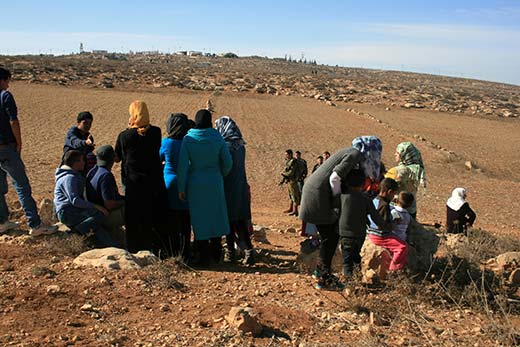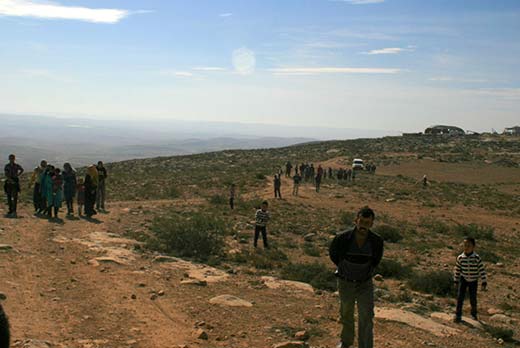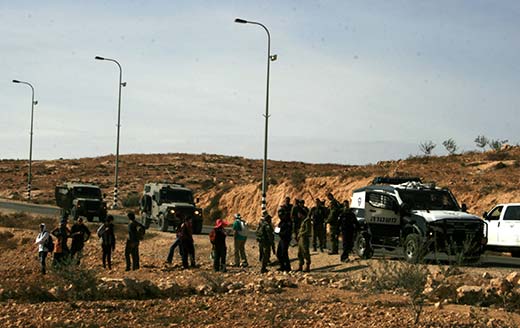Tuesday, 17 December 2013
Postcard from Palestine 13 - 3 Broken Cameras, 4 CMZs
Hebden Bridge's Ron Taylor is a regular visitor to Palestine, part of an international movement of supporters.
Originally this postcard was much longer; in fact it was more like a chapter. When I read it I feared it would be tedious (it probably still is). So I have pared it down and begun it with some basic information about the situation here in the West Bank.

After the attack -soldiers bar way on to stolen land
The South Hebron Hills lie in Area C of the West Bank. Most of the Palestinians living there rely on sheep/goat herding and the growing of some basic crops for their family incomes.
Area C forms 62% of West Bank land and is under full Israeli military and civil control. Much of what is left of Palestinian agriculture is in C and it is where the majority of Jewish settlers live (approx 350,000).
Apartheid-style, two legal systems operate in Area C. Palestinians are subject to Israeli military law, Jewish settlers to Israeli domestic law. Military law is much harsher than the latter.

Retreat after the attack
Under international law, all Israeli settlements are illegal. Israel, as the occupying power, is not entitled to transfer its own citizens to occupied territory (4th Geneva Convention). Settlement outposts (extensions of existing settlements) are even illegal under Israeli law as they have not been sanctioned by the state.
The Israeli government said it would dismantle many of these outposts but, aside from removing a small handful, they remain and grow. Many of the sanctioned settlements have started life this way and it seems that Israel has no real intention of keeping its promise.
Despite Israeli government attempts to hide the truth Peace Now - an Israeli anti-occupation group - has exposed the fact that 40% of settlements and outposts are built on privately-owned Palestinian land. Other land used for settlement construction is deemed ‘state land’, even though it is legally not part of Israel.

Military harassing Ta'ayush
Palestinians wanting to build any kind of structure in Area C must apply to the military authorities for a permit to do so. Permits are rarely granted. It is estimated that 94% of applications are rejected, As a consequence Palestinians often build without permits risking demolition. Even structures built before the occupation of 1967 are deemed to be illegally built. Most Palestinian structures in the South Hebron Hills, including water cisterns, houses and animal enclosures,are subject to demolition orders. Entire villages are threatened in this way. Meanwhile settlers continue to build illegally with little or threat of demolition.
A closed military zone (CMZ) is an area of land that the military declares off-limits to anyone but Israeli soldiers and those allowed to remain there. These zones often encompass land around settlements and outposts effectively excluding Palestinians who have land within them.
An estimated 7,500 Palestinian olive trees were destroyed or damaged by settlers in 2012. The chances of anyone being charged and convicted of such crimes are extremely low. Between 2005 and 2013 97.4% of complaints made by Palestinians were closed by the Israeli police without any indictments filed.
Ta’ayush is the Arab-Jewish Partnership. Israeli and international activists working with Palestinian communities to keep Palestinians on their land through direct action.
Another day with Ta’ayush, November 23rd, 2013
Each Saturday for more than a year Ta’ayush activists have accompanied Palestinian farmers and their families from Umm-al-Arayes as they try to access land which is rightfully theirs. The land they want to use is close to the illegal settlement of Mitzpe Yair, home to some of the most violent settlers in the West Bank. But it has been stolen by settlers.Each Saturday Israeli soldiers deny the farmers access declaring the land a CMZ.
On this particular Saturday some of the Palestinians decided to defy the CMZ order and entered their land. Two Ta’ayush activists decided to go with them to film events. I was some distance away at the time this but I could hear the shouts and screams.
This is a report and video of what happened.
Once satisfied that everyone was now out of harm’s way and those detained would have legal assistance we left Umm-al-Arayes. But it was not the end of our harassment by the Israeli military and police.
Briefly:
On reaching the main road to rendezvous with another Ta’ayush group and our transport 6 military and police vehicles were waiting for us. Another CMZ had been declared next to Avigail, another illegal outpost. We were threatened with arrest if we went beyond a certain point.
Nearby,outside the CMZ, we went to see an olive grove which, two days earlier, had been attacked by settlers. Around 60 five-year old trees had been destroyed. I was threatened with arrest for asking a policeman if anyone had been arrested for the crime. Perhaps he detected a touch of irony.
It was planned to take some of the severed olive branches to another nearby settlement and hold a silent protest. On the way there we were stopped by the military. Another CMZ had been declared and another threat of arrest was issued.
Finally, we decided to visit the Palestinian village of At-Tuwani, close to the settlement of Ma’on and its outpost Havat Ma’on. (Settlers from these places attack Palestinian children on their way to and from school - none as far as I know has been prosecuted for these crimes.) The entrance to the village was blocked by military vehicles. Another CMZ was in place and more threats of arrest were made.
During the discussion on the way back north to Bethlehem/Jerusalem it was agreed that the almost blanket coverage of the area with CMZs and the aggressive behaviour of the military and the police was unprecedented.
It was also agreed the harassment of Ta’ayush was retribution for the events of November 9th. See previous Postcard.
Israel is, of course, ‘the only democracy in the Middle East’ - for Jewish people that is!
From occupied Palestine and apartheid Israel.
Ron Taylor
See also
Postcard from Palestine 12 Another day with Ta'ayush (Nov 2013)
Postcard from Palestine 11 A Day with Ta'ayush (Oct 2013)
Postcard from Palestine 10 - Leaving Bethlehem (Jan 2013)
HebWeb Forum - Postcards from Palestine
Postcard from Palestine 9 - Destroying Palestine Bit by Bit
Postcard from Palestine 8 - Trees destroyed in revenge
Postcard from Palestine 7 - Normal life in Palestine
Postcard from Palestine 6 -Beer festival and closed military zones (2 November 2012)
Postcard from Palestine 5 - April 2012
Postcard from Palestine 4 - attacked by settlers
Postcard from Palestine 3 - detained by the Israeli army (16 March 2012)
Postcard from Palestine 2 (19 Feb 2012)
HebWeb Forum: Postcard from Palestine
Postcard from Palestine 1 (8 Feb 2012)
HebWeb News - Hebden Bridge Old Gits support Palestinian farmers

